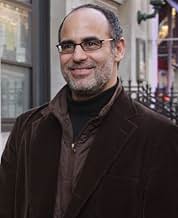IMDb RATING
6.9/10
3.4K
YOUR RATING
An ambitious graduate student convinces a writer that her thesis can resurrect his career.An ambitious graduate student convinces a writer that her thesis can resurrect his career.An ambitious graduate student convinces a writer that her thesis can resurrect his career.
- Director
- Writers
- Stars
- Awards
- 3 wins & 11 nominations total
- Director
- Writers
- All cast & crew
- Production, box office & more at IMDbPro
Featured reviews
Some writers receive early praise in their careers. Some even more talented ones never get their due because their work is not commercially satisfactory. In fact, it could be said that fame eludes a lot of brilliant authors who, as in the case of Leonard Schiller, must resort to a life of teaching in the great universities of the country. Schiller has only produced four novels, which sadly, seem to be out of print and unappreciated by even serious readers.
It is at this juncture of Leonard's life that a change occurs. When the eager young Heather, who wants to base her thesis on his books, comes to visit to ask if it could be possible to enlist him to help her with her paper. Leonard Schiller feels flattered and repulsed at the same time. He is a private man who has shunned notoriety and wants to stay that way, but ends up in going along with the young woman.
Leonard, a widower, has a daughter, Ariel, a woman in her early forties who believes her biological clock is running out of time if she is to have a baby. She had wanted to have a child with Casey, who doesn't cherish the thought of fatherhood and had broken with her. When he reappears, they renew their relationship with mixed results because Casey can't commit. This disparity is pointed out to Ariel by her father, who feels she is not getting her due.
Heather, we see moving closer and closer to Leonard. It appears inevitable they are headed for an involvement, one that he feels is more than what he wanted to get, especially with a woman way too young for him. The intensity of the feeling she provokes in him, surprises Schiller, who is in ill health, but he gives way to his fears jumping into an affair which will prove will not benefit either one of them.
"Starting Early in the Evening" is a small triumph for the team behind it, notably for director Andrew Wagner who gives the light touch the story requires. The film which is based on a Brian Morton book, which we haven't read, translates beautifully for the screen.
Frank Langella is simply marvelous playing Leonard Schiller. He is worth the price of admission. Obviously, the actor knows well how the character he is playing reacts to all the new sensations he discovers at a late age when the young woman comes into his life. Mr. Langella has never been better and more effective as he is in here. His take on this forgotten scholar is right on target.
Lauren Ambrose, whose work we have admired before, makes quite a case with her Heather. She is an eager young woman who probably has no intention of falling in love with the older man, yet, in her admiration for the author, she leaps into a serious situation that might not mean anything to her, yet, it has given Leonard a new taste in life.
Lily Taylor's Ariel is a complicated character. As the daughter, she is protective, yet, she ends up accepting a woman, much younger than her to be her father's lover. At the same time, her own life is in turmoil because of the motherhood she feels is denied to her. The brilliant Adrian Lester and Jessica Hecht add to the enjoyment of the film.
The film has a foreign film feeling to it. Andrew Wagner shows a sure hand in the final product and one can only wish him to continue along this way because he shows that he has talent and an eye for bringing out those hidden emotions in this interesting film.
It is at this juncture of Leonard's life that a change occurs. When the eager young Heather, who wants to base her thesis on his books, comes to visit to ask if it could be possible to enlist him to help her with her paper. Leonard Schiller feels flattered and repulsed at the same time. He is a private man who has shunned notoriety and wants to stay that way, but ends up in going along with the young woman.
Leonard, a widower, has a daughter, Ariel, a woman in her early forties who believes her biological clock is running out of time if she is to have a baby. She had wanted to have a child with Casey, who doesn't cherish the thought of fatherhood and had broken with her. When he reappears, they renew their relationship with mixed results because Casey can't commit. This disparity is pointed out to Ariel by her father, who feels she is not getting her due.
Heather, we see moving closer and closer to Leonard. It appears inevitable they are headed for an involvement, one that he feels is more than what he wanted to get, especially with a woman way too young for him. The intensity of the feeling she provokes in him, surprises Schiller, who is in ill health, but he gives way to his fears jumping into an affair which will prove will not benefit either one of them.
"Starting Early in the Evening" is a small triumph for the team behind it, notably for director Andrew Wagner who gives the light touch the story requires. The film which is based on a Brian Morton book, which we haven't read, translates beautifully for the screen.
Frank Langella is simply marvelous playing Leonard Schiller. He is worth the price of admission. Obviously, the actor knows well how the character he is playing reacts to all the new sensations he discovers at a late age when the young woman comes into his life. Mr. Langella has never been better and more effective as he is in here. His take on this forgotten scholar is right on target.
Lauren Ambrose, whose work we have admired before, makes quite a case with her Heather. She is an eager young woman who probably has no intention of falling in love with the older man, yet, in her admiration for the author, she leaps into a serious situation that might not mean anything to her, yet, it has given Leonard a new taste in life.
Lily Taylor's Ariel is a complicated character. As the daughter, she is protective, yet, she ends up accepting a woman, much younger than her to be her father's lover. At the same time, her own life is in turmoil because of the motherhood she feels is denied to her. The brilliant Adrian Lester and Jessica Hecht add to the enjoyment of the film.
The film has a foreign film feeling to it. Andrew Wagner shows a sure hand in the final product and one can only wish him to continue along this way because he shows that he has talent and an eye for bringing out those hidden emotions in this interesting film.
At the risk of sounding cliché', this movie is not for everyone. It moves a bit slowly in the beginning, and assumes a few things about its audience. But the overall feel of the movie, and the message that it communicates is very endearing.
Frank Langella is amazing as always, and perfectly captures what it's like to be a writer. His character is a true gentleman. He drinks tea, stands when a lady enters or leaves the room, and speaks honestly but with a polite tact when it's called for. It was really a nice thing to see.
Lili Taylor was hard to get a feel for. I just couldn't connect with her character. Probably because she was turning 40 and trying to have a kid. But her relationship with Adrian Lester was very genuine. They had a great chemistry that really played on the heart-strings.
Lauren Ambrose was a little quirky. The chemistry between her and Frank seemed too forced to me, and not because of the age difference. The only way I can describe it is by invoking the imagery of the unstoppable force meeting the immovable object.
But as I said, overall, the film is beautiful. The characters are richly developed, the music is beautiful, and the story really pulls you in as it unfolds. I wasn't quite sure how to feel about it, initially. But the more I watched, my love for the film gained momentum and really started to grow.
I would recommend this movie for readers, writers, and anyone who enjoys a good drama.
Frank Langella is amazing as always, and perfectly captures what it's like to be a writer. His character is a true gentleman. He drinks tea, stands when a lady enters or leaves the room, and speaks honestly but with a polite tact when it's called for. It was really a nice thing to see.
Lili Taylor was hard to get a feel for. I just couldn't connect with her character. Probably because she was turning 40 and trying to have a kid. But her relationship with Adrian Lester was very genuine. They had a great chemistry that really played on the heart-strings.
Lauren Ambrose was a little quirky. The chemistry between her and Frank seemed too forced to me, and not because of the age difference. The only way I can describe it is by invoking the imagery of the unstoppable force meeting the immovable object.
But as I said, overall, the film is beautiful. The characters are richly developed, the music is beautiful, and the story really pulls you in as it unfolds. I wasn't quite sure how to feel about it, initially. But the more I watched, my love for the film gained momentum and really started to grow.
I would recommend this movie for readers, writers, and anyone who enjoys a good drama.
Greetings again from the darkness. I saw two films here. One was spellbinding, fascinating and enlightening and featured a top-notch performance from Frank Langella. The "other" film was anytime Lauren Ambrose ("Six Feet Under") appeared on screen. Every time she opened her mouth, I felt myself deflate. Not only is she awkward to look at, but this part was poorly written and horribly acted. Langella was in an Oscar worthy film, while Ambrose was in a weak Lifetime flick.
Let's concentrate on the good stuff. Langella is Leonard Schiller, an aging novelist, who time not only has forgotten, but really never really knew in the first place. A grad student shows up under the premise of resurrecting his career through her thesis. One dose of reality later, they are spending enormous amounts of time talking about his life and writing. Langella's performance is so textured and subtle that we can feel his pain while recollecting and his anxiety while (almost) touching Ambrose (the grad student) for the first time.
This is director Andrew Wagner's first real film and he displays quite a knack for filming faces and allowing the pace of the film to mirror the reserved, simmering nature of Langella's character. Based on a novel by Brian Morton, the story focuses on a writer's desperation to finish his last novel but also on an aging man's struggle with a body that is continually letting him down ... at times to the point of humiliation.
Lili Taylor plays Langella's well meaning, but confused daughter who reconnects with an ex-lover played very well by Adrian Lester ("Primary Colors"). The sub-plots are a nice addition to the story and provide contrast to the reserved demeanor of Langella's character.
I have no idea how this film will ever find an audience, but those who love intricate character studies will be mesmerized by the Langella side of the film. Sadly, you will just have to fight through the whole grad student role ... think of it as the obnoxious person at an otherwise great party. Last note - the score is a nice compliment to the film and in lesser hands, could have been a distraction. Nicely done.
Let's concentrate on the good stuff. Langella is Leonard Schiller, an aging novelist, who time not only has forgotten, but really never really knew in the first place. A grad student shows up under the premise of resurrecting his career through her thesis. One dose of reality later, they are spending enormous amounts of time talking about his life and writing. Langella's performance is so textured and subtle that we can feel his pain while recollecting and his anxiety while (almost) touching Ambrose (the grad student) for the first time.
This is director Andrew Wagner's first real film and he displays quite a knack for filming faces and allowing the pace of the film to mirror the reserved, simmering nature of Langella's character. Based on a novel by Brian Morton, the story focuses on a writer's desperation to finish his last novel but also on an aging man's struggle with a body that is continually letting him down ... at times to the point of humiliation.
Lili Taylor plays Langella's well meaning, but confused daughter who reconnects with an ex-lover played very well by Adrian Lester ("Primary Colors"). The sub-plots are a nice addition to the story and provide contrast to the reserved demeanor of Langella's character.
I have no idea how this film will ever find an audience, but those who love intricate character studies will be mesmerized by the Langella side of the film. Sadly, you will just have to fight through the whole grad student role ... think of it as the obnoxious person at an otherwise great party. Last note - the score is a nice compliment to the film and in lesser hands, could have been a distraction. Nicely done.
10u2bme102
Unlike many movies, I found myself continually wanting to know what happens next. I was not watching a movie, so much as seeing the writing process examined, explored, and enacted on the screen. The director doesn't mind taking his time to allow events to develop and unfold, and he takes us along with him. Music is used sparingly and effectively - he has faith in his actors and his material. The attention to detail was wonderful - Leonard Schiller wearing shirts and ties many many years old, using spoons and tea cups from another era, sitting on a couch from the 40's, reading by lamps with pleated shades, walls and cupboards painted many times over, using a typewriter (hearing the clack clack of the keys was music), contrasted by Heather's tic tic on her laptop, her messy bed in the background, typing by a stylish modern lamp. Lauren Ambrose was the perfect counterpoint to Frank Langella, and the subplot with Lili Taylor as Ariel Schiller and Adrian Lester was touching and effective. At all times, the actors were perfect. They should all win Oscars, but they won't. Please don't be fooled by the paltry box office take of $600,000 - this movie is worthy of box office 100 times what it took in.
Anyone with a love of writing, good acting, and wonderful direction should see this movie. Even having Schilling's body begin to fail him rings true, and is not played for pathos.
All in all, one of the most enjoyable movie experiences of 2007.
Anyone with a love of writing, good acting, and wonderful direction should see this movie. Even having Schilling's body begin to fail him rings true, and is not played for pathos.
All in all, one of the most enjoyable movie experiences of 2007.
STARTING OUT IN THE EVENING is a quietly moving work of art, a film adapted from Brian Morton's novel by screenwriters Fred Parnes and Andrew Wagner and directed by Andrew Wagner that dares to take us to the wall with decisions we make about how we conduct our lives and negotiate the changes that can either be stumbling blocks or stimuli for creative awareness, It has much to say about the creative process of writing, a theme upon which it first appears to be based, but it more importantly urges us to examine how we live - how we make use of this moment of time in which we inhabit a body in the universe.
Leonard Schiller (in an extraordinarily understated performance by Frank Langella) is an aging author, a man whose first two novels seem to set the literary world on fire, but whose next two novels languished on the shelves and slipped into the same plane of obscurity Schiller finds his life since the death of hi wife. He has a daughter Ariel (Lili Taylor in another richly hued performance) who is nearing age forty and is unable to bond permanently with a man because of her obsession with having children before her biological clock ticks past fertility. Into their lives comes Heather Wolfe (Lauren Ambrose), a bright young graduate student who has elected to write her master's thesis on the works of Leonard Schiller. Schiller is absorbed in writing what may be his last novel and can't be bothered with Heather's plea for a series of interviews. But curiosity intervenes and soon heather and Leonard are involved in the process of interviewing, a process which gradually builds into overtones of heather' physical as well as intellectual attraction to Leonard. Meanwhile Ariel observes the process that seems to be infusing life into her father and encourages her to exit her current relationship with Victor (Michael Cumpsty) and re-connect with the true love of her life Casey (Adrian Lester), a man she loves but who refuses to give her the children she so desperately wants. The manner in these characters interact and learn from each other the importance of sharing Life instead of obsessing with selfish goals brings the drama to a rather open-ended close, another factor that makes this story significantly better than most themes of May-December romance and unilateral coping with self centered directions.
The pleasures of this film are many, but among the finest is the quality of acting by Langella, Taylor, Ambrose, and Lester. In many ways the story is a parallax of views of life as art that subtly intertwine like a fine string quartet. Why this film was ignored by the Oscars only suggests that movies for the mind take second place to movies for the merriment of entertainment. For people who enjoy the challenge of a meaty story, this film is a must. Grady Harp
Leonard Schiller (in an extraordinarily understated performance by Frank Langella) is an aging author, a man whose first two novels seem to set the literary world on fire, but whose next two novels languished on the shelves and slipped into the same plane of obscurity Schiller finds his life since the death of hi wife. He has a daughter Ariel (Lili Taylor in another richly hued performance) who is nearing age forty and is unable to bond permanently with a man because of her obsession with having children before her biological clock ticks past fertility. Into their lives comes Heather Wolfe (Lauren Ambrose), a bright young graduate student who has elected to write her master's thesis on the works of Leonard Schiller. Schiller is absorbed in writing what may be his last novel and can't be bothered with Heather's plea for a series of interviews. But curiosity intervenes and soon heather and Leonard are involved in the process of interviewing, a process which gradually builds into overtones of heather' physical as well as intellectual attraction to Leonard. Meanwhile Ariel observes the process that seems to be infusing life into her father and encourages her to exit her current relationship with Victor (Michael Cumpsty) and re-connect with the true love of her life Casey (Adrian Lester), a man she loves but who refuses to give her the children she so desperately wants. The manner in these characters interact and learn from each other the importance of sharing Life instead of obsessing with selfish goals brings the drama to a rather open-ended close, another factor that makes this story significantly better than most themes of May-December romance and unilateral coping with self centered directions.
The pleasures of this film are many, but among the finest is the quality of acting by Langella, Taylor, Ambrose, and Lester. In many ways the story is a parallax of views of life as art that subtly intertwine like a fine string quartet. Why this film was ignored by the Oscars only suggests that movies for the mind take second place to movies for the merriment of entertainment. For people who enjoy the challenge of a meaty story, this film is a must. Grady Harp
Did you know
- TriviaStu Richel played the husband of Jill Eikenberry in a scene with her former lover, played by Frank Langella. The Jill-Frank relationship was thought not to be "central to the spine of the story" and was dropped in the final cut.
- GoofsWhen Ariel wears her t-shirt in close-up shots, her necklace switches back and forth between hanging outside the shirt and mostly hidden under the shirt.
- Quotes
Leonard Schiller: Freedom isn't the choice the world encourages. You have to wear a suit of armor to defend it.
- SoundtracksSynchronicity
Written by Tameca Jones, Alex Biko, Brent Marley, Robert Belt and Jason White
Performed by 8 Million Stories
Courtesy of RipTide Music
- How long is Starting Out in the Evening?Powered by Alexa
Details
- Release date
- Country of origin
- Official site
- Language
- Also known as
- Начиная вечером
- Filming locations
- Upper West Side, Manhattan, New York City, New York, USA(Leonard sits on the bench in front of 201 W 83rd St, when Leonard has indigestion while walking with Heather.)
- Production companies
- See more company credits at IMDbPro
Box office
- Gross US & Canada
- $898,786
- Opening weekend US & Canada
- $76,214
- Nov 25, 2007
- Gross worldwide
- $898,786
- Runtime1 hour 51 minutes
- Color
- Sound mix
- Aspect ratio
- 1.85 : 1
Contribute to this page
Suggest an edit or add missing content

































